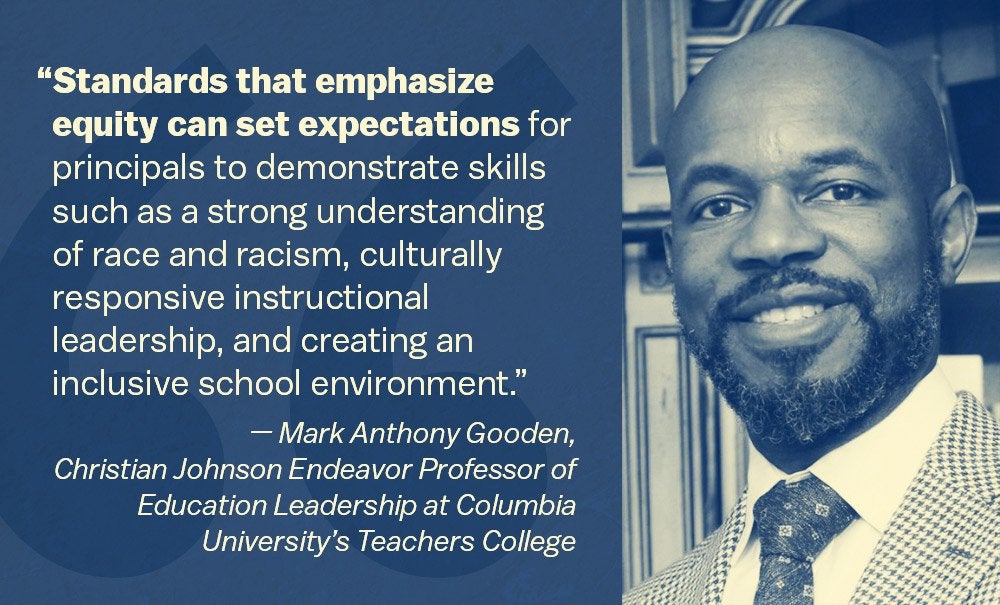“Are you ready to take risks?” This was the first question Mark Anthony Gooden, Christian Johnson Endeavor Professor of Education Leadership at Columbia University’s Teachers College, recently posed to an audience of elementary school principals and assistant principals. The setting was the annual conference of the National Association of Elementary School Principals (NAESP), and his question was the prelude to his presentation on how school leaders can be recruited and developed with an equity lens.
The “risk” in question referred to how the term “equity” has become a loaded phrase in education. “I don’t find equity to be a bad word,” Gooden told the audience, adding that he believes the term points to the following: making sure that the needs of each student are met, which entails understanding and confronting historical inequities and supporting marginalized students.
The session focused on a recently published report co-authored by Gooden, A Culturally Responsive School Leadership Approach to Developing Equity-Centered Principals: Considerations for Principal Pipelines. Commissioned by Wallace, this think piece examines decades of research to provide considerations for how principal pipelines that have been shown to produce school leaders who benefit student achievement might also produce leaders who benefit educational equity.
To help his audience members understand the broader context of his work, Gooden devoted part of his presentation to leading listeners through reflection and discussion activities that encouraged them to think about their own racial identity and experiences with equity. What had been key moments in their lives that involved race? Had these moments taken place in school settings? And how had they shaped the leadership tactics of APs and principals sitting in the audience?
On the matter of equity-centered principal pipelines, Gooden was referring to “comprehensive, aligned principal pipelines.” These are a type of pipeline whose effectiveness in aiding student achievement has rigorous research backing. The pipelines are called “comprehensive” because their components–such things as strong pre-service training and on-the-job support–cover a range of actions districts can take to improve the principalship. They are “aligned” because the components work in sync.
Drawing on his report, Gooden offered suggestions that districts could consider to incorporate equity within each of the seven key pipeline components: rigorous leader standards, high-quality principal preparation, selective hiring and placement, apt on-the-job support and evaluation, growth-oriented principal supervision, use of data to develop highly competent school leaders, and mechanisms to sustain the pipeline.
Gooden provided a mix of both ideas and questions that districts could ask themselves.
Equity starts with standards
Promoting equity-centered leadership starts with standards, which identify the professional knowledge and skills school leaders need. Standards that emphasize equity can set expectations for principals to demonstrate skills such as a strong understanding of race and racism, culturally responsive instructional leadership, and creating an inclusive school environment, Gooden said.
Reviewing admissions and curricula for preparation programs
Gooden asked the audience to consider the racial history of long-standing aspects of principal preparation and whether current practices and professional development efforts are beneficial and accessible to everyone. Some questions he encouraged preparation program leaders to reflect on: Do the programs train future principals to provide support to all students, staff, parents, and others? Do the programs have admission requirements that have little relation to needed skills and might be screening out candidates who are Black, indigenous, or people of color? Gooden also urged programs to take stock of whether their curricula and learning experiences are preparing principals to lead with equity.
Looking at hiring processes
Equity-centered school leadership requires a holistic approach to hiring, recruiting, and retention, according to Gooden. He said that including interview questions that focus on a candidate’s understanding of historical oppression can help employers learn about a candidate’s capacity to identify and confront inequities, including personal biases. He also recommended that the process of assessing and hiring candidates for the job includes the perspective and voices of members of the local communities with which the candidate would work. One question would be how the candidate plans to learn from those communities to better support students.
Equity-minded job support and evaluation/principal supervision
Supporting equity-focused leadership doesn’t end once a school leader has been hired, Gooden said, adding that on-the-job development should be ongoing to ensure principals have the tools, opportunities, and guidance needed to improve their leadership. Gooden suggested support for practices and activities that encourage self-reflection and increase self-awareness. He also proposed evaluation measures that look at a principal’s efforts to build relationships with students, staff, and communities and to challenge current practices that marginalize students.
Data for Equitable Development
What some people call “leader tracking systems” are repositories for the collection and organization of data throughout the progression of a principal’s career, from an aspiring school leader through the principalship and beyond. Gooden said these systems could be used to help examine and assess principal selection and to identify a school leader’s access to professional development opportunities. These systems can also provide transparency about the principal selection process and guide efforts that promote equitable principal pipelines.
Sustaining pipelines through sufficient resources, ongoing communications
Commitment to advancing equity requires ongoing support and participation from the district in ways that provide school leaders with the resources to ensure that each student’s needs are met, Gooden said. He also suggested cultivating communication and collaboration among the school, district, and communities to make certain all stakeholder voices are represented, heard, and appreciated.
Read the full report detailing Gooden and his team’s considerations for equity-centered principal pipelines.



